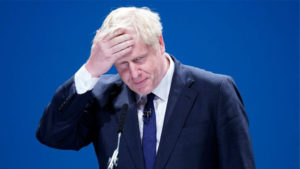 LONDON, United Kingdom (AFP) — Boris Johnson won the race to become Britain’s next prime minister on Tuesday, heading straight into a confrontation over Brexit with Brussels and Parliament, as well as a tense diplomatic standoff with Iran.
LONDON, United Kingdom (AFP) — Boris Johnson won the race to become Britain’s next prime minister on Tuesday, heading straight into a confrontation over Brexit with Brussels and Parliament, as well as a tense diplomatic standoff with Iran.
The former London mayor easily beat his rival, Foreign Secretary Jeremy Hunt, in a vote of members of the governing Conservative party.
He is expected to be confirmed as prime minister on Wednesday when his predecessor Theresa May formally tenders her resignation to Queen Elizabeth II.
US President Donald Trump was the first world leader to offer his congratulations, saying: “He will be great!”
It is a triumph for a man who has always wanted the top job. But Johnson, known for his jokes and bluster, is taking over at a time of immense political upheaval.
Three years after the referendum vote to leave the European Union, Britain remains a member amid continued wrangling in a divided Parliament on how to proceed.
Johnson led the 2016 “Leave” campaign and — after May delayed Brexit twice — insists the latest deadline must be kept, with or without a divorce agreement with the EU.
“We’re going to get Brexit done on October 31,” he declared in a speech to party members in London, after winning 66 per cent of almost 160,000 votes cast.
However, Brussels says it will not renegotiate the deal it struck with May to ease the end of a 46-year partnership — even after MPs rejected it three times.
EU negotiator Michel Barnier said Tuesday he wanted to work with Johnson “to facilitate the ratification of the withdrawal agreement and achieve an orderly #Brexit”.
Ursula von der Leyen, who will take over as head of the European Commission on November 1, congratulated Johnson but warned of “challenging times ahead of us”.
Although Parliament dislikes May’s deal, Johnson faces significant opposition from MPs to his threat to leaving with no deal, including from Conservative colleagues.
Several ministers said they will not serve under Johnson, warning that severing ties overnight with Britain’s closest trading partner is deeply irresponsible.
Business leaders called on the incoming leader to get a deal, with the director general of the Confederation of British Industry, Carolyn Fairbairn, saying he “must not underestimate the benefits of a good deal”.
Johnson insisted he would find a way through the deadlock: “Like some slumbering giant we are going to rise and ping off the guy ropes of self-doubt and negativity.”
